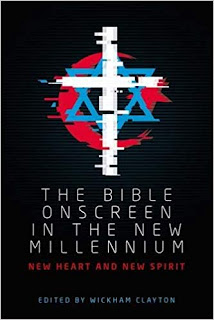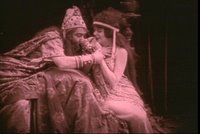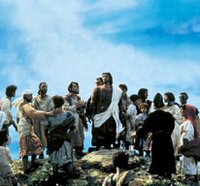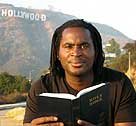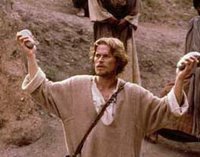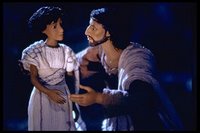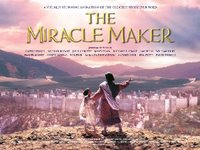
I finished reading the "Da Vinci Code" last week, which I thought was something I really ought to read both because so many people have already read the book, and to get some background for when the film comes out next month.
The book has been hitting the headlines again in it's own right recently because of the
court case which recently found in author Dan Brown's favour. Brown was being sued by Michael Baigent and Richard Leigh. Having read the book, any vague doubt I felt about my feeling that those authors were jumping on Brown's bandwagon (in what I can only imagine was an attempt to get a bit of extra cash) has disappeared. As
Lesa Bellevie said in
one of her posts at the Magdalene Review, "how, exactly, is a novelist supposed to 'correctly' credit a source?". Brown has tried as hard as he could, both in naming one character after the names of Leigh and Baigent (Teabing), but also in having said character discuss the various works that developed and popularised the theories on which it is based. Baigent and Leigh's book "Holy Blood and Holy Grail" is itself discussed by Sir Teabing for several lines.
But there are plenty of other news stories about the book. Just this weekend
Peter Chattaway passed on the claims that 1 in 6 believe the "Da Vinci Code" is true. I haven't seen the
source of the research from
the two
articles that Peter cites, so I can't quite work out what was actually asked, but it appears that the people weren't asked about belief in the "Da Vinci Code", but instead whether they believe Jesus's death was faked, and whether he had kids. Yet, Brown's novel never suggests Jesus's death was faked (quite the reverse). There seems to be a convenient media blurring of the edges at work here. Furthermore, the "Da Vinci Code" makes a large number of unusual claims. Even if people were asked whether they believe the "Da Vinci Code" it is doubtful a "yes" answer would mean they accepted all of them in the way a "yes" does when people are asked if they believe the bible.
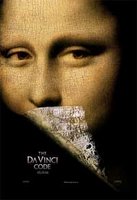
Putting the media coverage aside, what of the actual book? In it's favour it is certainly a gripping read. Right from the start the reader is drawn into the midst of what is happening, and wants to get to the bottom of things. Ultimately things get a little tedious, but for most of it's 600 pages it maintains the suspense really well. This alone meant that I found the book far more engaging than I had expected it to. The appearance of a new puzzle to be solved every 30 pages or so works as a nice device for giving the book momentum.
On the downside I found that despite its 600 pages I never really came to care about any of the characters. Sure I didn't want them to die or go to jail, but the characterisations were just a little too thin. Instead much of those 600 pages were spent in inserting meaningless details, that bore no relevance to the plot and mainly seemed to be included because they had turned up during the research, and Brown had either found them too interesting to leave out, or had included them just to reinforce the message that, yes, he really has done his research.
One of the other things I didn't like about the book is the use of pigeon-French. Thankfully by the end of the book, once things move to England the use of French subsides, partly because they are in England, but also partly (I suspect) because it just slips off the radar. It's a relief when it does, because much of it just seems a bit pretentious and patronising. It is particularly annoying when a conversation starts off in French, but then starts translating the more in-depth conversation, simply inserting words like "he continued in French". A minor gripe perhaps, but there were times when this made me laugh out loud.
There were two sections in particular that I disliked, which I simply can't believe the books editors didn't remove. The first comes in chapters 72, 76 & 77 which is seeking an ancient word of wisdom. Thanks to a very basic grasp of Greek I suspected the moment I head it the word would be
sofia, particularly as the lead female character is called Sophie. Apparently though, despite being an ace cryptographer, and granddaughter of a master of codes and meanings, Sophie is completely unaware of the meaning of her own name, leaving two professors scrabbling around to try and work that out. Really?
The second such section is chapter 92 when Langdon and Sophie arrive in the Library at King's College. For some reason Brown seems to think it is necessary to explain to us at length just how to use a search engine.
It is of course the theological "claims" of this story that have garnered the most attention, (and here the ending is perhaps most disappointing), and I suppose some people will find its claims credible, but really the whole story is something of a spiders web: No piece is strong enough to hold the book's claims alone, instead it has been cleverly spun together from facts and/or assertions to trap the unwitting reader. Some of the individual steps hold far more weight than others, but ultimately it's composed of very little substance; its strength lies only in the way it's spun together.
Or putting it another way - it's full of holes.
Yes Jesus could have been married, the argument from silence is based on our cultural assumptions not those of 1st century Judaism. If he had had a child I think we probably would have known about it, but even so it does not affect who he was and what he did.
Yes the church has oppressed groups down the years, and whilst that sullies our record, it does not automatically mean that those we oppressed were the bearers of the real truth.
Yes the church has borrowed imagery from other religions including paganism. Yet, that in itself does not mean that the concrete reality behind the borrowed metaphors is false.

Four things disturb me about the Christian response to this film. Firstly, that there have been so many conflicting opinions, boycotting, dialoguing, watching other films and even ignoring them. Mark Moring over at
Christianity Today has done a wonderful piece on this (thanks to
Jeffrey Overstreet for the tip off). For some reasons Christians feel threatened by this and don't know how to act.
Secondly, that there has been so much written about the book in response that it's starting to look suspicious. I don't mean so much the written-for-free opinion pieces (like this one), nor the journals that are covering it as they would for anything else. No, what dismays me is the myriad of books being written in response. It's worth having a few - let's face it one book would not suit all - but to have quite so many just rings of trying to make quick bucks, and gain a bit more influence, or reputation.
Thirdly, so many of the responses seem to be answering the wrong questions. Much of the attention seems to have focussed on the "was Jesus married" question. As I said above, whilst most Christians would probably say that he wasn't married, from a theological position, it makes no difference. Quite simply, the bible never says he wasn't married - it's open to interpretation. Were he to have had a child then that would be more significant, but again it is arguing from silence, and has no impact on Jesus himself.
What is more crucial is the questions the book poses about the history of early Christianity, how certain views gain precedence over others how we came to possess the bible we have today, what came to be defined as orthodox. It is here that the bible is most challenging, but here that there is much less material debunking these claims. Which leads me on to my fourth point - that much of this mess is of our own making, and no-one seems to say it.

Protestant Church leaders have by and large neglected to teach their congregations about the roots of Christianity. It wasn't a simple process, which does raise a few questions. As a result it's been seen as a bit too embarrassing and been shrouded in mystery, and nudged towards the sidelines in the hope that no-one will ever ask about it.
Unfortunately, now people are asking about it, and the church is so undernourished in this respect that it doesn't really know how to respond. The sad thing is that there is a solid case for the various processes and church councils, but unless people know about them then they are blown about by the wind.
I'd like to make one final point. Brown's book has caused many to laud the power of story telling. In some ways it's good to see story telling back on the agenda, for as Christians, we have a great one to tell. In other ways though, story telling has been absent from our culture for a while, and as a result we have forgotten how to take it. On his website,
Brown makes a number of interesting statements. He implies that he himself doesn't believe everything in his books, and claims to be a Christian. Yet he has been very selective of the evidence his characters espouse and has them exaggerate some of the historical details to make their case more believable. Why? Perhaps it's simply because it makes good fiction. And fiction, by definition, doesn't need to be true.
However, Brown also stresses that he hopes his work of fiction will "serve as a catalyst and a springboard for people to discuss the important topics of faith, religion, and history." It is certainly doing that, on a scale far beyond what he would ever have expected. At the same time I think
Josh McDowell could well be right when states that "truth will always stand". The question is will the church "be ready to give an answer to everyone who asks" in the meantime?
 See all posts on this film
See all posts on this film






